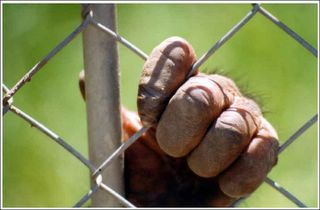(Deuteronomy 12:30)
"Gary Richmond used to work at a zoo that had a thirteen-foot-long king cobra. It’s venom glands contained enough poison to kill a thousand adults. The cobra had a scar that made him look like the embodiment of evil, but worse, it meant that when the snake shed his skin, the eye cap did not come off. It had to be removed by hand. And, unfortunately, snakes don’t have hands.
This required a team of five people: two keepers, the zoo’s curator, a veterinarian, and Gary – whose job was to furnish the scalpel and sponge to the vet. The cobra slithered from it’s den, spread it’s cape, raised itself up to full stature, and looked at the five intruders, deciding on his first victim. He chose the curator. With lighting speed the keepers threw their nets around the writhing snake, the curator grasped it behind the venom glands, and the vet said, ‘Let’s get this over.’ His hands were trembling; beads of sweat were dripping off everyone’s forehead but the snake’s.
The vet asked if Gary had any cuts on his hands.
“No.”
He told Gary to wad up paper towels and stuff them in the cobra’s mouth.
“Okay.”
The cobra bit and chewed until the towels were yellow and dripping with venom.
As the team worked, the curator explained that every year several full-grown elephants die from king cobra bites. A man could never survive a bite with a full load of venom. This is why he was having Gary drain the snake’s venom sacs. The curator’s hands were sweating, and his muscles were weakening; his fingers were starting to cramp – which could not have been good news to anyone except maybe the snake.
The curator wasn’t sure they could move quickly enough when it was time for the release. Then he explained what we might call the secret of the snake: More people are bitten trying to let go of snakes than when they grab them.
This is true of everything that can destroy human character: deceit, bitterness, pornography, greed, debt, and workaholism. This is the power of addiction, and sin is, among other things, addictive. These sins are serpents that will quickly weaken the human spirit.
It is a fatal tendency of human beings to think we can handle the snake on our own. This has been going on since the Garden of Eden. When the serpent tempted Eve, what she did not do is significant. She did not talk about the temptation with Adam. She did not discuss it with God. One of the first signs that we’re in trouble with a temptation is that we don’t reveal it to anybody else. We keep the snake a secret because at some level we want to retain the option of grabbing it. We keep temptation a secret because we want the option of giving in to it undiscovered.”[1]
q Are there any snakes you’re holding on to?
q It was stated above, “We keep the snake a secret because at some level we want to retain the option of grabbing it. We keep temptation a secret because we want the option of giving in to it undiscovered.” Are there any thoughts and/or feelings that you’ve been entertaining, that you’ve yet to share with someone else for the very reason stated in the quote above?
“It is easier to stay out than to get out."
Mark Twain
“Temptation is the fire that brings up the scum of the heart."
William Shakespeare
“God is better served in resisting a temptation to evil
than in many formal prayers.”
Penn
Iron Eyes Cody is a native American actor who once did a TV spot for the Keep America Beautiful campaign. He was an Indian drifting alone in a canoe. As he saw how our waters are being polluted, a single tear rolled down his cheek, telling the whole story. This powerful public service commercial still shows up on TV screens after 17 years. In 1988 Cody repeated an old Indian legend in Guideposts magazine. Here it is:
Many years ago, Indian youths would go away in solitude to prepare for manhood. One such youth hiked into a beautiful valley, green with trees, bright with flowers. There he fasted. But on the third day, as he looked up at the surrounding mountains, he noticed one tall rugged peak, capped with dazzling snow. I will test myself against that mountain, he thought. He put on his buffalo-hide shirt, threw his blanket over his shoulders and set off to climb the peak. When he reached the top he stood on the rim of the world. He could see forever, and his heart swelled with pride. Then he heard a rustle at his feet, and looking down, he saw a snake. Before he could move, the snake spoke. “I am about to die,” said the snake. “It is too cold for me up here and I am freezing. There is no food and I am starving. Put me under your shirt and take me down to the valley.” “No,” said the youth. “I am forewarned. I know your kind. You are a rattlesnake. If I pick you up, you will bite, and your bite will kill me.” “Not so,” said the snake. “I will treat you differently. If you do this for me, you will be special. I will not harm you.” The youth resisted awhile, but this was a very persuasive snake with beautiful markings. At last the youth tucked it under his shirt and carried it down to the valley. There he laid it gently on the grass, when suddenly the snake coiled, rattled, and leapt, biting him on the leg. “But you promised...” cried the youth. “You knew what I was when you picked me up.” said the snake as it slithered away.”[2]
From Witch Doctor to Unitarian Pastor
A lady called concerning her eight year old daughter. She had sought help from a Christian psychiatric hospital and they had referred her to me. Now divorced she and her daughter lived alone in an apartment. Her former husband, the girl’s father, was a Unitarian pastor. Prior to that, he had been an African witch doctor in a tribe known as “The Leopard People.” The mother had studied metaphysical religion and had also been ordained as a pastor in the Unity Church. She had read extensively concerning the occult, but now testified of having recently been born again.
When our deliverance team arrived, she explained that her daughter was being harassed in her sleep by demonic forces. She was having nightmares, and would wake up in the night seeing “ghosts”. The “ghosts” were demons appearing in the aboriginal forms of an old African man and woman. She would sometimes wake in the morning with humanlike bite marks in the middle of her back. One night a plague of flies filled the girl’s room. She awakened her mother several times that night complaining of flies biting her. Her mother turned on the light and searched the room but could not find flies anywhere. The next morning, when her mother opened the window shades, she found piles of dead flies on her daughter’s window sill.
At first, the mother seemed desperate. As we prayed through the apartment for wisdom and discernment, we waited for the Holy Spirit’s direction. The spiritually attuned intercessors with me felt ill at ease in certain rooms. There was a definite “spiritual discomfort.” At times, “words of knowledge” (1 Corinthians 12:8) came to the team members. We found occult art work and a large library of occult books.
We explained to the lady that the books and the art work were like “bait.” They were attracting the demonic spirits that were harassing her and her child. The books were also symbols of contracts she had made with the enemy. These things communicated to the spirits that they were welcome and had legal permission to stay. Such items and artifacts my mean little to you and much to the enemy.[3]
[1] John Ortberg, Everybody’s Normal, 176-178. Referencing: Gary Richmond, A View from the Zoo Series. Nashville: W Publishing Group.
[2] Bits and Pieces, June, 1990, pp. 5-7.
[3] Eddie Smith, Spiritual House cleaning, Houston: Spirit Truth, 1997, 16.



